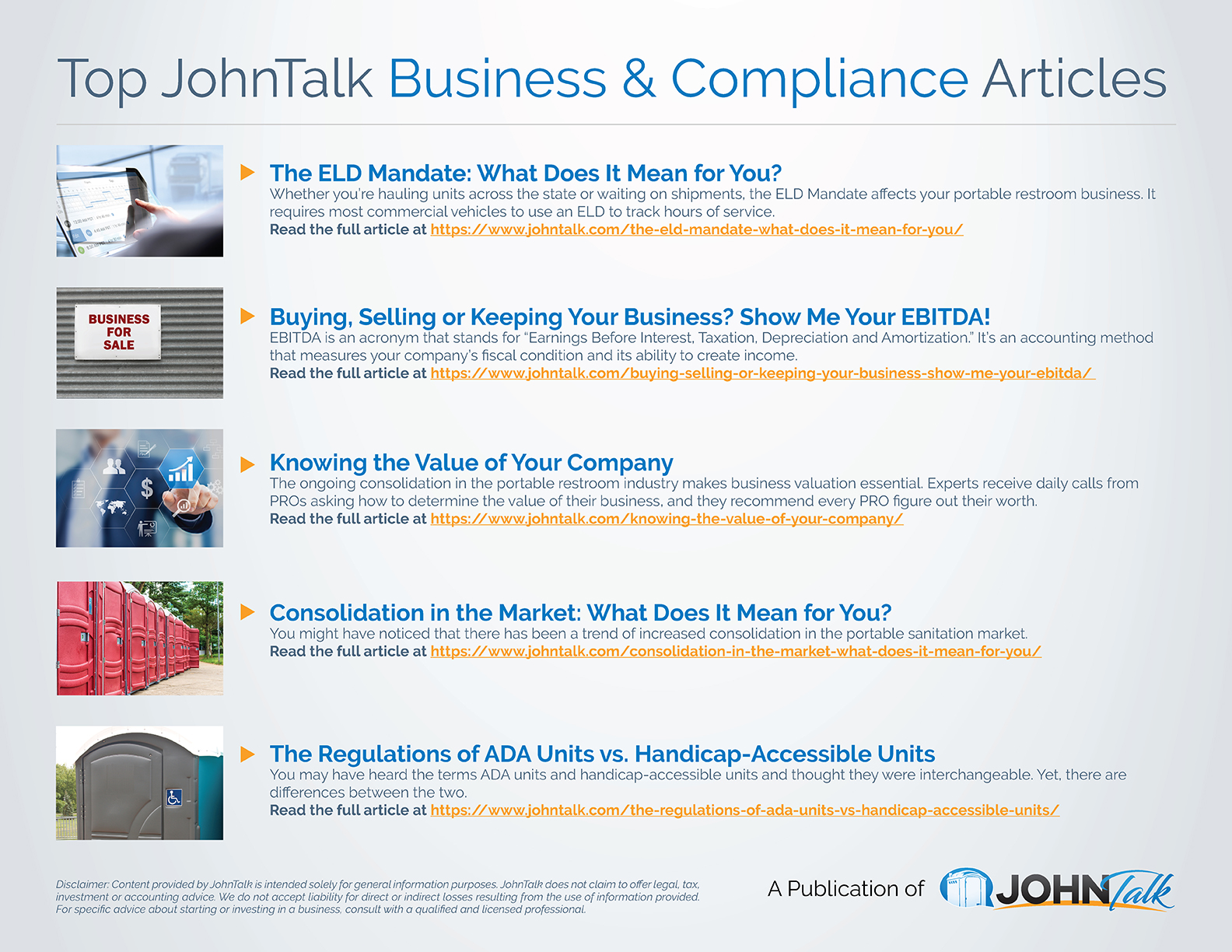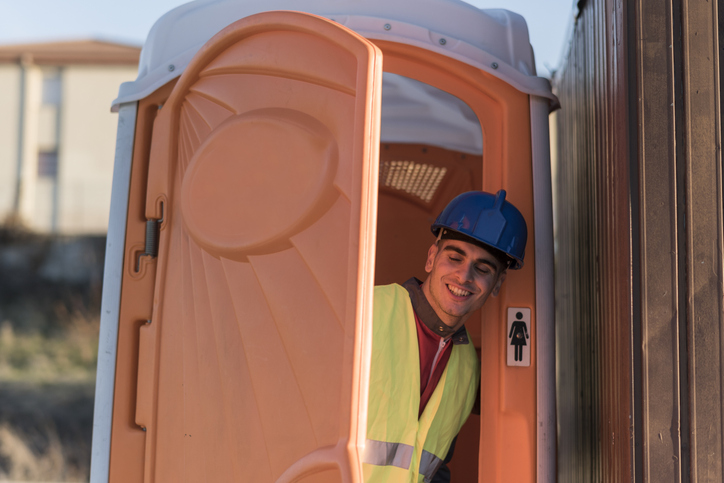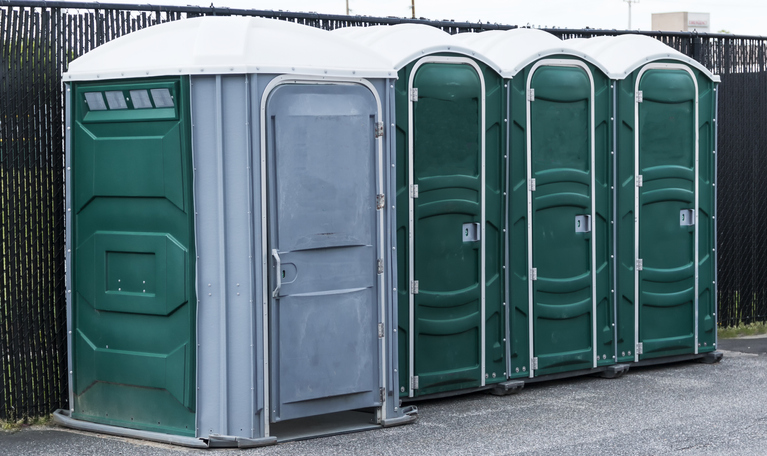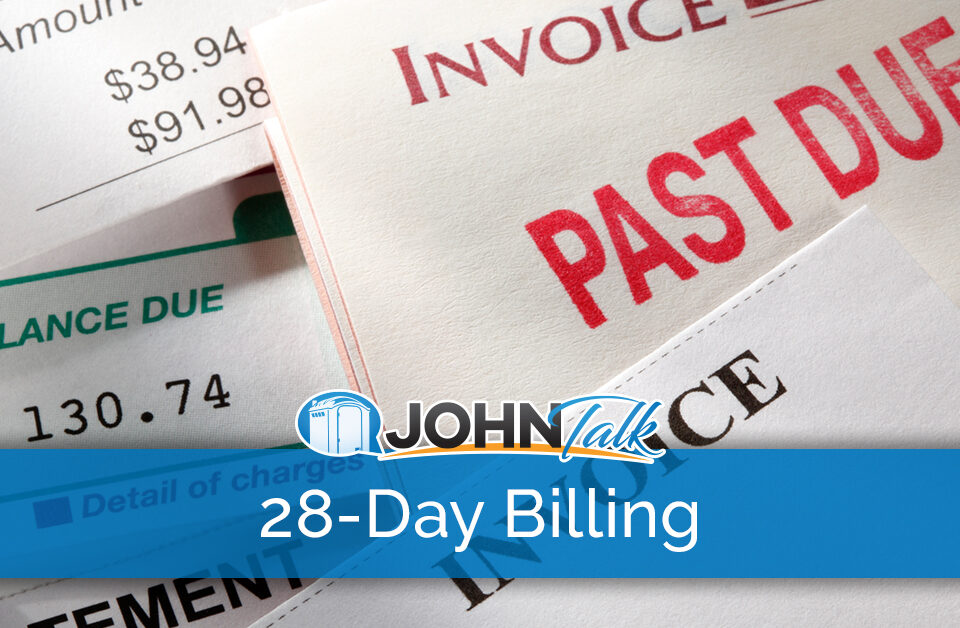
INFOGRAPHIC: Top JohnTalk Business & Compliance Articles
May 20, 2019
How to Manage Millennial Employees
June 3, 2019
How much should I charge for my services? Pricing is usually the most vexing issue that startups face. It can be for established businesses as well. There are so many factors to consider — or disregard — depending on your particular circumstances.
Pricing is not an exact science. There is no mathematical formula to determine prices. This is not surprising because every business is a unique mix of inventory, budget, customers, competition, service area and goals.
It’s also hard to research pricing. Information is not easily available. It’s extremely rare to find prices listed on websites, for example. You have to dig deeper to find helpful guidance.
At our request, several PROs have stepped forward and volunteered to share their prices. They represent different geographic areas and individual opinions. We hope it’s a helpful starting point as you learn more about the portable sanitation industry. As you gain experience, you will gain greater confidence in setting your own prices.
Disclaimer: The prices in this article are intended solely for general information purposes. They may or may not be appropriate for your particular business.
Develop a Pricing Strategy
Good pricing is based on good information. Take a wide view and consider all the major factors that can help determine the prices you will charge, including:
- Geography: Do you have a lot of miles to cover on your route(s)? What part of the country do you live in?
- Demographics: How closely grouped or far apart are your customers? In big cities or rural areas?
- Cost of inventory, fuel, waste treatment, overhead, utilities, salaries and supplies: What does it cost to run your business?
- Competition’s prices: How much do your competitors charge?
- Business plan: What are your financial goals? How quickly are you projecting to make a profit? How much do you want to expand your business?
The Small Business Association (SBA) recommends that you take a critical look at your competitors to develop your pricing system. It’s a common practice in the industry to become a “secret shopper,” contacting competitors anonymously in order to inquire about their rates.
To also give you a general sense of prices in your area, ask your friends or business associates if they have recently rented a portable toilet or filled out a “request for quote” form from a local company for an event. Ask friends in construction about their costs for long-term rental.
Check out the SBA’s “Introduction to Pricing” at https://www.sba.gov/course/introduction-pricing/.
If you are working with a business mentor, this is a high-priority topic to discuss.
However, it is not advised to simply have the lowest prices in the area. Longtime PROs will tell you, your prices should reflect the quality of your service.
Options Help Determine Pricing
Consider your customers when pricing. Customers like having choices. Give them a range of product options and prices.
Rentals usually fall into two categories:
- Special events (public and private)
- Construction, agricultural and industrial sites
Special event options might include:
- Standard units
- Standard units with sinks
- Deluxe units (sink and recirculating flush toilet)
- Handicap-accessible units
- ADA-compliant units
- Sinks
- Hand sanitizing stands
Construction/monthly rentals usually offer fewer options:
- Standard units
- Handicap-accessible units
- Sinks
- Containment trays
Other Pricing Considerations
You may have to adjust your rates when you consider certain circumstances. This can be to your benefit because it gives you additional sources of income and the opportunity to build better relationships.
- Accessories such as liquid soap dispensers, convenience shelves and lights are a common extra charge for special events. At a work site, hand sanitizer is a popular extra.
- Volume discounts are common (and even expected), especially for special events and large construction customers. If you have room on your truck for one more unit, the cost of delivering two units is about the same as one, so you can offer a discount and still come out ahead. Volume discounts, backed by great service, can help you earn customer loyalty. They help build your market share and prevent rivals from building theirs.
- Emergencies are another source of income. Your fast response to an emergency, such as a same-day delivery, is worth the extra cost for a customer. Give the customer what they need in an emergency and you can win their loyalty!
- In colder climates, PROs may consider fees or increased costs due to additional cold-weather precautions such as winterizing units to prevent freezing.
Review Your Prices
Some PROs keep the same rates for years without a problem, but your prices don’t have to be set in stone. Review them periodically. Entrepreneur.com’s Small Business Encyclopedia lists several instances when it is recommended to review your prices, including when:
- You introduce a new product
- Your costs change
- You enter a new market
- Your competitors change their prices
Let’s see how a few PROs handle pricing.
Get the JohnTalk “ALL-ACCESS PASS” & become a member for FREE!
Benefits Include: Subscription to JohnTalk Digital & Print Newsletters • JohnTalk Vault In-Depth Content • Full Access to the JohnTalk Classifieds & Ask a PRO Forum
PRO Pricing Examples
IDAHO
A-1 Rentals
Wes Thompson
https://a1rental.net/index.asp
Wes Thompson’s A-1 Rentals has been in portable toilet rental since 1986, and today has more than 650 units and five service trucks. With two locations, the A-1 service area covers a radius of about 300 miles, so productivity is key. For A-1, it means each driver is handling 45-50 units, minimum, per day.
“Make the work quick and easy for your drivers,” he advised.
Efficiency is maximized with practices such as limiting left turns and using routing software. A-1 provides comfortable, high-end trucks.
“They are the drivers’ offices,” Thompson said.
Major considerations for pricing include the cost of supplies per unit, mileage and waste management fees.
- Monthly: $70-80/unit (billed on 28-day cycle)
- Weekly: $50/unit
- Weekend: $35/unit
- Daily: $25/unit
- Handicap-accessible and ADA-compliant unit: $50/day, $100/month
Weekly service includes:
- Sanitized and scented
- 2 extra-large rolls of toilet paper
- Sanitizer is included as a courtesy to customers. (However, Thompson noted that if the dispenser is misused or vandalized, he removes them.)
A-1 handles emergencies on a case-by-case basis, but beyond about 25 miles, there is a $100 charge and servicing is $15/unit.
A-1 has additional winter costs, but Thompson doesn’t pass those along to his customers, especially with a dozen competitors to consider. The goal is to have a full, productive winter season.
Recently, Thopmson was asked if he would reduce his rates by servicing units once every two weeks instead of weekly, but he declined. Besides dealing with a potentially gross, overflowing toilet and the environmental and regulatory concerns it might create, “It’s my company name on the door,” he said. “I run my company like I was a customer.”
NEW JERSEY
P&W Services
Martin Senoff
Martin Senoff received his septage permit that enabled him to start P&W Services in October 2016 and now has 350 units.
P&W’s current rate is $120 per 28-day billing cycle, with a $45 pickup/delivery fee that is billed upfront.
Senoff noted that in the startup days of the business, his prices were “all across the chart.” He was willing to meet prices in order to get his foot in the door. Over time, as he acquired more work, he was able to more accurately account for all his expenses to precisely determine rental costs.
Discounts are flexible.
“We look at the discounts on a case-by-case basis,” he said. “Such as, how many units, how many services per week, and where it is on our routes, to come up with a price. We also lower our price a little bit if it is going to be a permanent unit.”
Charges for emergencies are also handled on a case-by-case basis. (Emergencies are also one of the best ways to see the valuable role portable sanitation plays in daily life.) As one typical example, P&W received a call from a sports complex. It was 11:00 a.m. on the Saturday of Father’s Day weekend, and they had no water or septic. P&W had 10 units set up by 2:00 p.m. The charge was $200 per toilet for up to one-week rental and $30 per day per unit for cleaning. The units needed to be cleaned on Sunday, Monday, Tuesday and Wednesday and were picked up on Thursday.
P&W has monthly meetings to review pricing.
TEXAS
Texan Restrooms
Devan Hanson
https://www.texanrestrooms.com/
Texan Restrooms is a rarity – prices are listed on the website. It wasn’t a difficult decision for owner Devan Hanson. He was well aware that other companies called to learn his rates, a common practice in the industry. And in a recent article published in PRO Monthly, Hanson said, “No one wants to have to call somebody to figure out how much something costs. That’s just the world we live in today.”
Construction Restroom
Add $50.00 to first month for delivery.
Prices do not include damage waiver of $7.50 per unit (optional)
Price is Billed 28-day advanced
Weekly service included in prices
1 unit: $92.50 + tax
2: $85.00 each + tax
3: $85.00 each + tax
4-7: $75.00 each + tax
8-10: $70.00 each + tax
11-20, 21-100 and 100+ CALL FOR QUOTE
Special Event Restroom
$50.00 fee for delivery of 10 restrooms or less
Price is Per Event
1 unit: $150.00 + tax + delivery = $212.38
2: $226.00 + tax + delivery fee = $294.65
3: $315.00 + tax + delivery fee = $390.99
4-7: $95.00 each + tax + delivery fee
8-10: $85.00 each + tax + delivery fee
11-20: $75.00 each + tax + delivery fee
21-100, 100+ CALL FOR QUOTE
Bravo II Hand Wash Station
No delivery fee if ordered with restrooms
Once a week service is included
1 station: $95.00 + tax = $102.83 Monthly $75.00 + tax = $81.19 Per Event
2: $75.00 each + tax = $162.38
3: $70.00 each + tax = $211.09
4-7: $65.00 each + tax
8-10: $60.00 each + tax
11-20: $55.00 each +tax
21-100, 100+ CALL FOR QUOTE
Hand Sanitizer Station
No delivery fee if ordered with restrooms
Once a week service included
1 station: $80.00 + tax = $86.60 Monthly $75.00 + tax = $81.19 Per Event
2: $75.00 each + tax = $162.38
3: $75.00 each + tax = $243.56
4-7: $70.00 each + tax
8-10: $65.00 each + tax
11-20: $60.00 each + tax
21-100, 100+ CALL FOR QUOTE
Holding Tank
$50.00 delivery fee
Once a week service included
1 tank: $250.00 + tax = $270.63
2: $225.00 + tax = $487.13
3: $215.00 + tax = $698.21
4-7: $195.00 each + tax
8-10: $185.00 each + tax
11-20: $175.00 each + tax
21-100, 100+ CALL FOR QUOTE
MINNESOTA
Jimmy’s Johnnys
Rich Anderson
- Standard unit: $110.00 – Price includes hand sanitizer
- Deluxe model: $165 for weekend – Unit features flushing toilet, sink, mirror, paper towels and soap dispenser
- Handicap-accessible unit: $200
- Standalone sink: $95
- Executive restroom trailer (14 ft.): $950 for weekend.
- Delivery to Twin City area is $250. Requires a $250 damage deposit.
- Serves up to 1,000. Features running water, flushing toilets and air conditioning. Trailers in 18-, 20- and 24-foot lengths also available (handle up to 2,000 people). Contact for quote.
Job sites
Prices are per each 28-day billing cycle, not including tax. Prorated after the first four weeks.
- Regular unit (includes once-a-week service): $110.00
- Twice-a-week servicing: $100.00 (additional)
- Containment pan: $20.00 (if needed)
- Hand sanitizer: $10.00
- Winter charge (Nov 1st to March 15th): $20.00
- Heater: $20.00 (if needed)
- Delivery: $35.00 (if not on route)
- Damage waiver: $10.00 (optional)
- Environmental fee: $8.00 ($16 for 2x/week service)
- Fuel: $10.00 ($20 for 2x week service)
- Tip over fee/Extra service: $35.00
- Short Term Rental: $110.00 (less than 1 week with no service)
Jimmy’s Johnnys’ owner Rich Anderson has been keeping tabs on the market for 20 years. For many of those years, $75 was always the “magic number” in construction for renting a unit in the service area. It was such a well-established price that no company dared to go higher. Finally, facing years of rising costs, but still unwilling to break the magic $75, someone started charging a “fee” for fuel. It worked, so other additional fees followed, such as an “environmental fee” for dumping. JJs calculated the total costs and established one price. But as a result, they often lost business because, as Anderson explained, “‘$75 plus applicable fees’ looked less expensive than ‘$110.’” Even when the fees were explained in the fine print, JJs still often lost out.
Does that mean it’s a good idea to hide a total price behind fees? Definitely not, Anderson said. Be upfront about costs. JJs has often won back customers when they realized they were paying a lot more than they originally thought they would once the fees were added. Anderson said construction companies would “blow a gasket” when they realized that “$75 plus applicable fees” resulted in an actual cost of $140 or so.
Another area of consideration that depends on the particular situation is pricing for volume orders. Large construction companies that have many units on-site expect discounts, Anderson said. If you know your competition offers them, then it’s probably a necessity. But the advantages run both ways. Volume rentals, especially at one site, provide a reliable source of income, and the actual service costs are less because you save on travel time and fuel.
Anderson often hears from startups from all parts of the country. His most important advice on pricing is “patience.” Price decently so you can make a profit and deliver good service. Then be patient in earning new business, and resist the urge to undercut prices. Anderson gave an example of a startup in his service area that practiced “predatory pricing.” By the time the company failed and had to sell off assets, the pumper truck had broken down. In order to keep undercutting prices, the owner couldn’t even pay for basic truck upkeep.
MIDWEST
This company (the owner asked to remain anonymous) has hundreds of units and a wide-ranging service area. Establishing a pricing strategy is a goal-oriented pursuit – with the goal of staying profitable. The owner said, “I would knock on 100 doors to find 10 that would pay a good price.”
As an example of a formula for setting prices, for long-term sites, the owner tracked the cost of each route and added a 30% profit margin to the price.
- Construction sites: $135/unit
- Public and personal events: $105/unit
- Flushing unit: $175
- Handicap-accessible: $175
- ADA-compliant: $225
- 3-stall trailers: $1,300
“Lay out a vision for where you want your business to be in one, three and five years,” the owner advised entrepreneurs just getting into the industry. “You can’t hit a goal that you didn’t set.”
Disclaimer: Content provided by JohnTalk is intended solely for general information purposes. JohnTalk does not claim to offer legal, tax, investment or accounting advice. We do not accept liability for direct or indirect losses resulting from the use of information provided. For specific advice about starting or investing in a business, consult with a qualified and licensed professional.
Looking to Take Your Portable Restroom Business to the NEXT LEVEL? Download our FREE Guide: “Your Guide to Operating A Portable Restroom Business.”
Thinking About GETTING INTO the Portable Restroom Industry? Download our FREE Guide: “Your Guide to Starting A Portable Restroom Business.”




